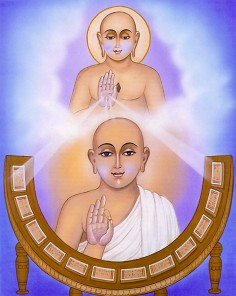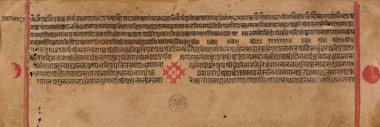Sixth Lecture: The False Ascetic [1]
All men who are ignorant of the Truth are subject to pain; in the endless Saṃsāra they suffer in many ways. (1)
Therefore a wise man, who considers well the ways that lead to bondage[2] and birth, should himself search for the truth, and be kind towards all creatures. (2)
“Mother, father, daughter-in-law, brother, wife, and sons will not be able to help me, when I suffer for my own deeds.”[3] (3)
This truth should be taken to heart[4] by a man of pure faith; he should (therefore) cut off greed and love, and not hanker after his former connections. (4)
Cows and horses, jewels and earrings, cattle, slaves and servants: all these (possessions) you must give up in order to obtain the power of changing your form at will. (5)[5]
Everything that happens to somebody, affects him personally; therefore, knowing the creatures’ love of their own self, do not deprive them of their life, but cease from endangering and combating them. (6)
Seeing that to accept (presents) leads to hell, one should not accept even a blade of grass; only to preserve one’s life[6] one should eat the food that is put in one’s own alms-bowl. (7)
Here some are of opinion that they will be delivered from all misery by merely attending the teacher,[7] without abstaining from sins. (8)
Acknowledging the truth about bondage and liberation, but talking only, not acting (in accordance with these tenets), they seek comfort for themselves in mighty words. (9)
Clever talking will not work salvation; how should philosophical instruction do it? Fools, though sinking lower and lower through their sins, believe themselves to be wise men. (to)
They are (going) a long way in the endless Saṃsāra; therefore looking out carefully one should wander about carefully.[8] (11)
Choosing what is beyond and above (this world, viz. liberation), one should never desire (worldly objects), but sustain one’s body only to be able to annihilate one’s Karman. (12)
Those will reap pains who, in thoughts, words, or acts, are attached to their body, to colours, and to forms. (13)
Recognising the cause of Karman, one should wander about waiting for one’s death; (knowing) the permitted quantity of food and drink, one should eat (such food as has been) prepared (by the householders for their own consumption). (14)
An ascetic should not lay by any store, not even so little as the grease (sticking to his alms-bowl); but as a bird with its plumage,[9] so he with his alms-bowl should wander about without desires. (15)
Receiving alms in a manner to avoid faults,[10] and controlling one’s self, one should wander about in a village (etc.) without a fixed residence; careful among the careless one should beg one’s food. (16)
Thus has spoken the Arhat Jñātṛputra, the venerable native of Vaiśālī,[11] who possesses the highest knowledge and who possesses the highest faith, who possesses (at the same time) the highest knowledge and the highest faith. (17)
Thus I say.
 Ganadhar Sudharma Swami
Ganadhar Sudharma Swami
